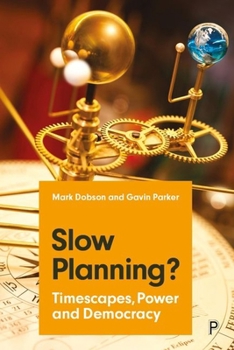Slow Planning?: Timescapes, Power and Democracy
A deep exploration on how questions of time and its organisation affect planning practice, this book is aimed at public and private planning practitioners, national and local politicians and policy makers involved in planning, academics and students studying planning and related disciplines.
It presents time as a pervasive form of power that is used to shape democratic practices, and questions 'project speed' where time to think, deliberate and plan has been squeezed. The authors demonstrate the many benefits of slow planning for the key participants, multiple interests and planning system overall.
Format:Paperback
Language:English
ISBN:1447367715
ISBN13:9781447367710
Release Date:May 2025
Publisher:Policy Press
Length:188 Pages
Related Subjects
Architecture Political Science Politics & Social Sciences Social Science Social SciencesCustomer Reviews
0 rating





